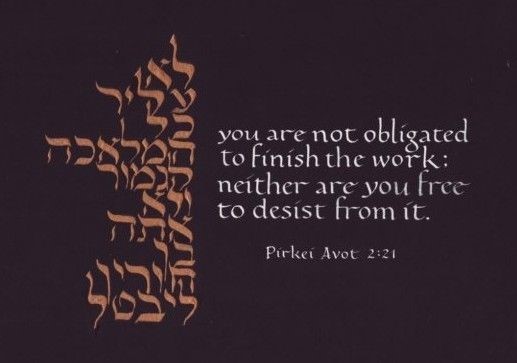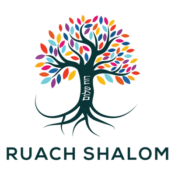This week we finish reading the book of Exodus. It’s a book that, like the story we will recall in a few weeks at Pesach, starts with misery and oppression and ends with hope and confidence. Feels like a bit of a familiar cycle both as the Jewish people but also for each of us individually – misery and oppression (even of the psychological kind), hope and confidence and sometimes
back again and again.
And from the last few parashot which we read this week we learn quite a bit. On the surface, Moses and the Israelites follow God’s instructions and create a Tabernacle, a tent of meeting and they follow all of the rules around how to use it. But what we have, just a few levels deeper, is a blueprint for making large scale social change in the world. And this Shabbat, as we focus our thoughts and energy across the Netherlands on the topic of caring for our earth, this is just the blueprint that we need.
One of my all time favorite quotes from Pirkei Avot 2:21 is “You are not obligated to complete the work, but neither are you free to desist from it”. I love this statement. I love it because it doesn’t specify what “the work” is, it just simply and elegantly acknowledges that there is work to be done. And that work comes in so many forms that sometimes it overwhelms us. It so overwhelms us sometimes that we withdraw. We don’t know where to begin. We don’t know how to help. But, we learn, we are obligated to tikkun olam, we are obligated to begin the work, to contribute to the work. And we are assured in the Torah that day and night as we do this work, the divine spirit is with us, guiding us.
And so let’s try it. Let’s try to follow the blueprint that God has left us in the book of Exodus. God requires a few things of the Israelites.
First, God requires that people care. It is pretty easy to wander through our days checking off our to do lists and you can imagine that life of wandering around a desert, collecting food, finding shelter, creating a society was work enough. At the end of the day, everyone wanted to put their feet up in their tents by a lovely fire and call it a day. But God called on them to do more. God called on the Israelites to do their daily work but also to be part of the community – of the system of justice, of the building of the tabernacle, of the creation of a priesthood. Today we call those “extracurricular activities” and they have been hard to do in these times of Covid.
Second God asks that people engage and invest – material investment and investment of skills and craftsmanship. In the building of the tabernacle God asks the Israelites to contribute the needed materials and the people come forward – with jewelry, with linens and skins and spices and oils. Exodus 35 says “let every wise hearted person among you come and make all that God has commanded. And they came. Everyone whose heart stirred him up, and every one whom his spirit made him willing”. And this is the next step in our blueprint. We each have to look inside of ourselves and consider – what can we invest. What special items and skills – is it a carbon neutral car, biking instead of riding? Is it our eloquence at delivering speeches or our networks of people who we can compel to make choices that enhance and benefit our earth?
Lastly God asks people to have vision and hope. What is right now will not always be. There wasn’t always a hole in the ozone layer. There weren’t always melting ice caps. There used to be more than 1 white rhinoceros. What we have done we can undo. The society and the tabernacle that the Israelites created in the book of Exodus was created so that it could be portable and so that no matter the conditions, it could be changed or moved – continuing to evolve as they moved toward the promised land. And we too need to have vision and hope.
For the Israelites that looked like arriving in the promised land. For us, it means envisioning a world of trees growing where the ground is currently bare. It’s a vision of skating again on icy canals. It’s a vision of vanishing wildlife repopulating. It’s a vision of an earth replenished, a world that can renew together.
The blueprint that our Torah portion gives us, when we really boil it to it’s core is simple. Individually and as a community we must care. We must engage and invest our unique skills. And we must have vision and hope. “You are not obligated to finish the work” – it is bigger than any one of us. “But neither are you free to desist from it” – without each person moving, we all stand still.
Adonai, we have so much work ahead of us to restore and renew the bounty of the earth that we all call home. Let us each find the care and compassion for each other and for our planet, let us each reflect and discover the resources and talents that we have and use them to have true impact. Let us always remember that there is beauty and hope and resilience in nature that is beyond compare. And let us hold the earth in our minds and hearts as we follow your blueprint together toward our own promised land – an earth renewed.
Kein Y’Hi Ratzon, May This Be God’s Will

